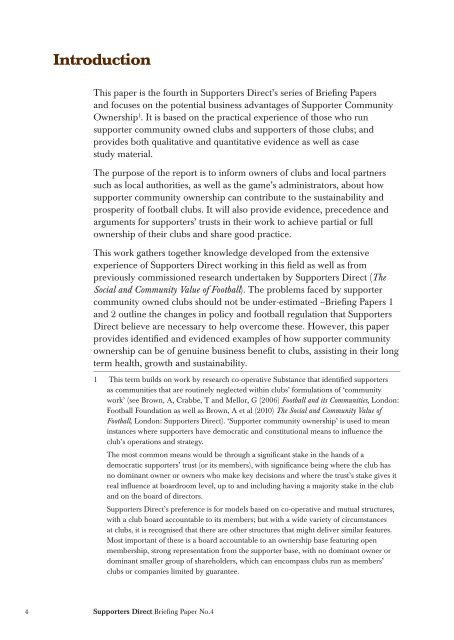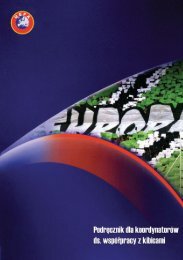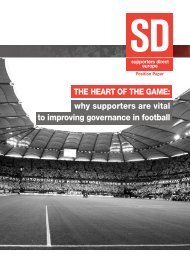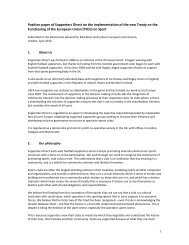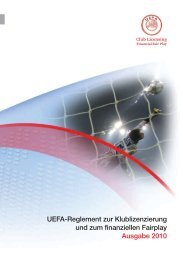Business Advantages of Supporter Community ... - Supporters Direct
Business Advantages of Supporter Community ... - Supporters Direct
Business Advantages of Supporter Community ... - Supporters Direct
You also want an ePaper? Increase the reach of your titles
YUMPU automatically turns print PDFs into web optimized ePapers that Google loves.
IntroductionThis paper is the fourth in <strong>Supporter</strong>s <strong>Direct</strong>’s series <strong>of</strong> Briefing Papersand focuses on the potential business advantages <strong>of</strong> <strong>Supporter</strong> <strong>Community</strong>Ownership 1 . It is based on the practical experience <strong>of</strong> those who runsupporter community owned clubs and supporters <strong>of</strong> those clubs; andprovides both qualitative and quantitative evidence as well as casestudy material.The purpose <strong>of</strong> the report is to inform owners <strong>of</strong> clubs and local partnerssuch as local authorities, as well as the game’s administrators, about howsupporter community ownership can contribute to the sustainability andprosperity <strong>of</strong> football clubs. It will also provide evidence, precedence andarguments for supporters’ trusts in their work to achieve partial or fullownership <strong>of</strong> their clubs and share good practice.This work gathers together knowledge developed from the extensiveexperience <strong>of</strong> <strong>Supporter</strong>s <strong>Direct</strong> working in this field as well as frompreviously commissioned research undertaken by <strong>Supporter</strong>s <strong>Direct</strong> (TheSocial and <strong>Community</strong> Value <strong>of</strong> Football). The problems faced by supportercommunity owned clubs should not be under-estimated –Briefing Papers 1and 2 outline the changes in policy and football regulation that <strong>Supporter</strong>s<strong>Direct</strong> believe are necessary to help overcome these. However, this paperprovides identified and evidenced examples <strong>of</strong> how supporter communityownership can be <strong>of</strong> genuine business benefit to clubs, assisting in their longterm health, growth and sustainability.1 This term builds on work by research co-operative Substance that identified supportersas communities that are routinely neglected within clubs’ formulations <strong>of</strong> ‘communitywork’ (see Brown, A, Crabbe, T and Mellor, G (2006) Football and its Communities, London:Football Foundation as well as Brown, A et al (2010) The Social and <strong>Community</strong> Value <strong>of</strong>Football, London: <strong>Supporter</strong>s <strong>Direct</strong>). ‘<strong>Supporter</strong> community ownership’ is used to meaninstances where supporters have democratic and constitutional means to influence theclub’s operations and strategy.The most common means would be through a significant stake in the hands <strong>of</strong> ademocratic supporters’ trust (or its members), with significance being where the club hasno dominant owner or owners who make key decisions and where the trust’s stake gives itreal influence at boardroom level, up to and including having a majority stake in the cluband on the board <strong>of</strong> directors.<strong>Supporter</strong>s <strong>Direct</strong>’s preference is for models based on co-operative and mutual structures,with a club board accountable to its members; but with a wide variety <strong>of</strong> circumstancesat clubs, it is recognised that there are other structures that might deliver similar features.Most important <strong>of</strong> these is a board accountable to an ownership base featuring openmembership, strong representation from the supporter base, with no dominant owner ordominant smaller group <strong>of</strong> shareholders, which can encompass clubs run as members’clubs or companies limited by guarantee.4 <strong>Supporter</strong>s <strong>Direct</strong> Briefing Paper No.4


